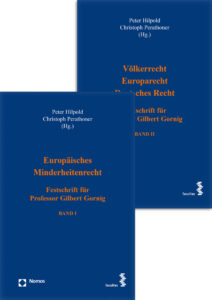Not Being Elected
The AfD parliamentary group in the Brandenburg state parliament has a right to equal opportunities. But it does not have the right to have one of its own elected to the Parliamentary Control Commission and thus possibly gain an insight into what the internal intelligence service Landesamt für Verfassungschutz knows about the Nazis in Brandenburg and from whom. This was decided by the State Constitutional Court in Potsdam this week, and I consider that good news.
The Parliamentary Control Commissions (PKK) are an oddity of German parliamentary law, by means of which something like the appearance of parliamentary control of the intelligence services is created on the federal and state level: A select handful of MPs get access to pretty much everything they want to know about the work and findings of the services, but they are not allowed to share their knowledge with anyone, not even with their fellow MPs, and certainly not with the public. This has little to do with parliamentary control, with the gathering and deliberation of government information, with making the government publicly accountable. But at least someone is looking at what the services are doing, which is certainly better than nothing.
++++++++++Advertisement++++++++

On the 12th March 2024, the University of Barcelona will host a conference on systemic discrimination and the law as part of an EU-funded project called UNDETERRED. The conference is open to academics wishing to present a paper on how systemic discrimination is addressed (or not) in one given country, or to provide a more comparative or conceptual analysis. Please send your draft proposals before the 31st October 2023 to the following address: sebastien.platon@u-bordeaux.fr
For more information please click here.
++++++++++++++++++++++
The AfD wants to get a seat on that table, and it’s not hard to understand why. The party is a potential target of Verfassungsschutz surveillance in Brandenburg. At the same time, it is the largest opposition group in the state parliament. The opposition must be “adequately represented” in the Parliamentary Control Commission according to section 24 (1) of the Constitutional Protection Act. In February 2020, the state parliament decided that the Brandenburg PKK should have six members, one seat for each parliamentary group represented in the state parliament. But only five were elected. The AfD candidate did not get a majority. This was repeated until all 23 members of the parliamentary group had run once without success. None of them was deemed trustworthy enough by the Landtag majority to gather sufficient votes. The Landtag presidium initiated a “moderation process” to find a way to fill these and other open positions to which the AfD was entitled. Unsuccessfully. In December 2021, the AfD parliamentary group filed a lawsuit. On Wednesday, it was dismissed by a 6:2 majority on the Potsdam bench.
The Brandenburg Constitutional Court had already made it clear in 2016 that the AfD parliamentary group has no right to appoint or delegate its members to the PKK. It cannot simply determine who should represent it in the PKK, as it can with ordinary parliamentary committees (art. 70 para. 2 p. 2 BrbLV). The PKK is not a normal committee set up by parliament to prepare its resolutions, but a body sui generis whose members are elected and not appointed and delegated by the parliamentary groups. But that does not mean that the majority can simply gang up and systematically deny the minority any participation. That was the angle which the AfD tried this time before the Constitutional Court: Its right to equal opportunities required a PKK mirroring the plenum, and if the majority so stubbornly denied it this, then it was violating this right.
I was able to obtain the still unpublished judgement. Here is the argument which runs somewhat parallel to that of the Federal Constitutional Court in the question of the AfD’s claim to a seat in the Bundestag presidium: The members of the PKK must be elected by the members of the state parliament, and their free mandate would no longer be free if they were obliged to vote for a certain candidate or even to disclose why they did or did not vote for him. According to the Potsdam Constitutional Court, the state constitution leaves it up to the state parliament to decide how the PKK is composed. The PKK “in essence exercises specific membership rights of the MPs” and must therefore “in principle” be composed as a mirror image of the plenum, but the Landtag must “carefully balance” this principle with the free mandate of the MPs within the framework of its procedural autonomy. This is what the Landtag had done, by making sure “that only deputies are elected to the body who personally enjoy the confidence of the majority of the Landtag, whose professional competence and discretion are therefore established to the conviction of the majority”. Confidence of the majority in parliament is what actually the government needs to obtain in a parliamentary democracy. Once again, a sign of the oddity of this whole thing, I guess.
++++++++++Advertisement++++++++

Fakultätsgeschäftsführer*in (m/w/d) gesucht!
Die Juristische Fakultät der Georg-August-Universität besetzt zum nächstmöglichen Zeitpunkt die Stelle des/der Fakultätsgeschäftsführer*in neu (Besoldungsgruppe A 15 NBesO; E15 TV-L). Wir suchen eine engagierte und belastbare Persönlichkeit mit ausgeprägter Organisations- und Kommunikationskompetenz für eine interessante, facettenreiche Aufgabe mit vielseitigen Gestaltungsmöglichkeiten. Die detaillierte Ausschreibung (ID 74182) unter Stellen OBP – Georg-August-Universität Göttingen (uni-goettingen.de)
++++++++++++++++++++++
Parliamentary vice-presidents, committee chairmen, intelligence service oversight: wherever you look, majoritarian elections and non-elections abound, that’s just the way it is nowadays in these times of sprawling authoritarian populism. That is how it works, even without participation in government, from a position of minority, that is how it brings creeping constitutional change about. There are good reasons why the Brandenburg Constitutional Court speaks of confidence. What is at stake here is the mutual confidence between political opponents, so necessary for the functioning of democracy, that in the end neither side is interested in destroying the conditions for the possibility of political diversity. If authoritarian populism deserved this trust, it would not be authoritarian populism. This is the difference between the present and the 1980s, when the ruling CDU wanted to keep the Greens out of intelligence control at all costs, and the 1990s, when the same thing happened to the Left. The “integrative moment” of participation in the parliamentary process and the publicity of the proceedings, to quote Ernst-Gottfried Mahrenholz’s dissenting opinion in the 1986 FCC judgement on budgetary control of the intelligence services, was able to do its work in both cases over the years, and in both directions. Anyone who believes that this will also work with the AfD should just take a quick look at the state of parliamentary democracy in, say, the UK. Not to mention Hungary and Poland.
In Thuringia, by the way, unlike in Saxony, there is no AfD member in the PKK for the time being either. But there may soon be no more PKK at all. In 2020, at the request of the AfD, the Weimar Constitutional Court issued an interim injunction prohibiting the state parliament from constituting the PKK “before it has ensured through suitable procedural precautions, for example within the framework of a formal or informal agreement procedure, that election proposals of the applicant are not rejected for improper reasons”. As a result, Thuringia amended its constitutional protection law at the end of last year and made the election of a PKK member conditional on a two-thirds majority. (Irony: if you go to the website of the Thuringian Ministry of the Interior to find out about the current legal situation, you will still find the old version, according to which the AfD was entitled to a representation in the PKK corresponding to its parliamentary group strength).
The consequence was that, all of a sudden, the CDU finds itself suddenly unable to vote for the candidates of the Left Party. The current state parliament has so far been unable to elect the control commission, so that for the time being the commission of the last legislative period, which has shrunk to 3 of the actual 5 members, remains in office. This may work until the elections in autumn next year. But after that? The AfD will most likely then have more than a third of the seats in the Erfurt Landtag and thus a blocking minority. (I talked to DIE ZEIT this week about what else such a blocking minority could entail).
The week on Verfassungsblog
In India, the authoritarian populist BJP government has announced sweeping criminal justice reforms and has marketed this move as a radical break with the colonial origins of the existing laws. In reality, according to ABHINAV SEKHRI, it is the opposite, namely “a resurgence of the colonial-style authoritarian approach”.
In Israel, demonstrations against the subjugation of the Supreme Court by the authoritarian-populist Netanyahu government continue. ROMAN ZINIGRAD, however, warns against investing too much hope in the Supreme Court and the judiciary in general. “The role of the Supreme Court in the growth of Israel’s democracy has been of a reinforcing, rather than constitutive nature; so was its contribution to the government’s previous authoritarian adventures.”
++++++++++Advertisement++++++++

Die zweibändige Festschrift zu Ehren von Professor Gilbert Gornig feiert das Lebenswerk eines herausragenden Rechtswissenschaftlers und Menschen. Als Wissenschaftler hat er Beeindruckendes geleistet und wirkt nach wie vor beispielgebend, nicht zuletzt für den akademischen Nachwuchs. Als Mensch überzeugt er durch Humanität und seine Fähigkeit zur Empathie. Beide Bände der Festschrift spiegeln die Vielzahl an Rechtsgebieten wider, in welchen der Jubilar wirkte und wirkt. Dazu zählt vor allem das Minderheitenrecht, aber auch das Völkerrecht, das Europarecht sowie das deutsche Recht im Allgemeinen.
Die Festschrift ist hier erhältlich.
++++++++++++++++++++++
Over the past decade, the European Union has grown to become the leading regulator of American tech companies, writes ANU BRADFORD in a spectacular long-read. Europe writes the rules and builds on the pillars of fundamental rights, democracy, fairness and redistribution its digital constitution, while the techno-libertarian US watches from the sidelines. But the European digital constitution also has its weaknesses.
One part of this digital constitution is the planned regulation of artificial intelligence in the EU (AI Act). According to LJUBISA METIKOS, legal-doctrinal work will not be enough to fill the gaps in its broad and vague regulations. An interdisciplinary approach is needed.
KATHARINA NATTER examines the EU-Tunisia agreement to jointly keep refugees and migrants away. The deal is an example of the rise of informal soft law policies and risks it entails for migrants, but also for EU citizens in general.
The German federal government wants to raise the Bürgergeld, but not the tax-free subsistence level. TIM BUCHHOLZ thinks that this is might constitute a violation of the consistency requirement arising from Article 3 of the Basic Law.
++++++++++Advertisement++++++++

Das Forschungsprogramm Wissen & Gesellschaft am Alexander von Humboldt Institut für Internet und Gesellschaft betreibt grundlagenorientierte und angewandte Wissenschafts- und Hochschulforschung.
Wir suchen zum nächstmöglichen Zeitpunkt eine*n studentische*n Mitarbeiter*in (m/w/d) für ein neues Forschungsprojekt zu den rechtlichen Bedingungen von fairem Open Access, zusammen mit dem Projektpartner Verfassungsblog.
++++++++++++++++++++++
Finally, we have started what I think is an extraordinarily interesting blog symposium this week: it is about the question of whether and when and why parliamentary decisions “on their own behalf” should be seen as a constitutional problem. Following the opening post by SOPHIE SCHÖNBERGER, first MARTIN MORLOK, JELENA VON ACHENBACH and MICHAELA HAILBRONNER approach the topic on an abstract level, further contributions also on specific aspects such as electoral law or the law of political foundations as well as views from abroad will follow in the next few days.
That’s all for now. All the best to and see you next week!
Max Steinbeis
If you would like to receive the weekly editorial as an email, you can subscribe here.
A previous version of this editorial contained a factual error regarding the seat of the Thuringian Constitutional Court which has been corrected.



